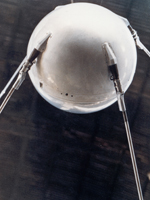WEB FOCUS
Russian science

In this focus
On 4 October 1957, the Soviet Union launched Sputnik 1. Fifty years on, Nature explores the current state of Russian science and commemorates the beginning of the space age with a special package of news and comment. Three News Features report on the state of science in Russia today, focusing on the modernization of the 300-year-old Russian Academy of Sciences and exploring the experiences of those who have lived and worked in Russia. A Commentary from former Russian science minister Boris Saltykov sets out the opportunities for innovation today. Alexei Kojevnikov's Essay argues that Sputnik spawned the modern international research community. William Burrows reviews Matthew Brzezinski's book Red Moon Rising about how the space race grew out of Cold War tensions, Giovanni Bignami reflects on two new related documentaries and Martin Kemp analyses the immortality of space dog Laika.
Image: NASA
Editorial
Time for a fresh start free access
Fifty years after the momentous launch of Sputnik, Russia has yet to find a scientific system that is anything close to meeting its twenty-first century needs.
Nature 449, 507 (4 October 2007) doi:10.1038/449507a
Top of page
News
50 years in space free access
On 4 October 1957, Sputnik launched us on a path into space.
Geoff Brumfiel
NatureNews (4 October 2007) doi:10.1038/news.2007.141
Time to rethink the Outer Space Treaty
An agreement forged 40 years ago can't by itself keep space free of weaponry, says Philip Ball.
NatureNews (4 October 2007) doi:10.1038/news.2007.142
Top of page
News Features
The battle for Russia's brains
The Russian Academy of Sciences has resisted pressure from czarists and communists. Can it thwart the reforms planned by Putin's government? Quirin Schiermeier reports.
Nature 449, 524 (4 October 2007) doi:10.1038/449524a
What the scientists say
Russian researchers, and those who have worked in Russia, share their thoughts with Nature on the problems faced by
the country's scientific system — and how they could be addressed.
Alexander Sobolev et al.
Nature 449, 528 (4 October 2007) doi:10.1038/449528a
A question of survival
International collaboration and a can-do spirit have allowed some Russian scientists to flourish. Alison Abbott watches an extraordinary field test for mutant mice in the Russian wilderness.
Nature 449, 532–534 (4 October 2007) doi:10.1038/449532a
Top of page
Podcast

Hear more about how the launch of Sputnik surprised the world. Geoff Brumfiel talks to
space scientists and historians on the 4th October 2007 Nature Podcast.
Top of page
Commentary
Breaking up is hard to do
Economist and former science minister Boris G. Saltykov sees opportunity for change and innovation in Russia.
Nature 449, 536–537 (4 October 2007) doi:10.1038/449536a
Top of page
Essay
The little ball made science bigger
When the Sputnik satellite went into orbit in 1957, it revolutionized the practice of international science and changed the demography of Western
research.
Alexei Kojevnikov
Nature 449, 542 (4 October 2007) doi:10.1038/449542a
Top of page
Books & Arts
A celebration of Sputnik's fiftieth birthday
The launch of the first satellite sparked rejoicing worldwide but frayed some nerves in the West.
William E. Burrows
Nature 449, 538 (4 October 2007) doi:10.1038/449538a
Earth's fearful travelling companion
Giovanni F Bignami
Nature 449, 539 (4 October 2007) doi:10.1038/449539b
A dog's life
Laika, the doomed stray, has achieved a kind of immortality
Martin Kemp
Nature 449, 541 (4 October 2007) doi:10.1038/449541a
